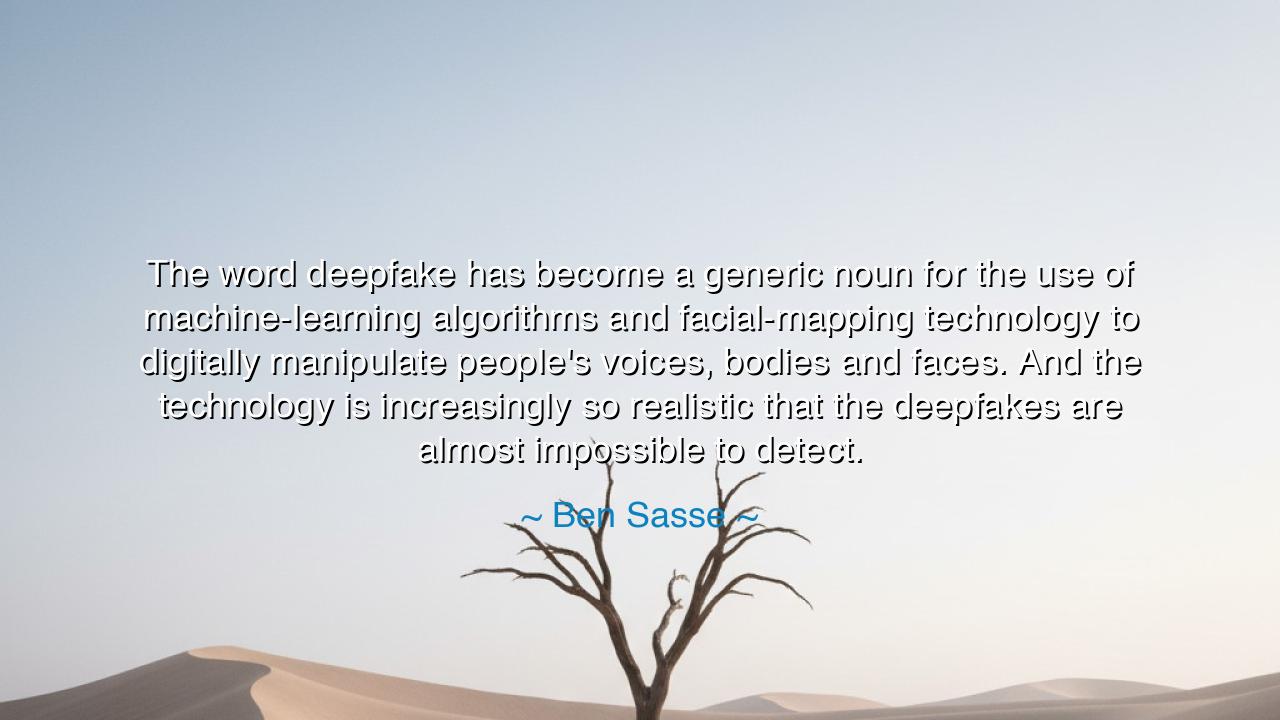
The word deepfake has become a generic noun for the use of
The word deepfake has become a generic noun for the use of machine-learning algorithms and facial-mapping technology to digitally manipulate people's voices, bodies and faces. And the technology is increasingly so realistic that the deepfakes are almost impossible to detect.






Hear the warning voice of Ben Sasse, who beheld the dawn of a perilous age and declared: “The word deepfake has become a generic noun for the use of machine-learning algorithms and facial-mapping technology to digitally manipulate people’s voices, bodies and faces. And the technology is increasingly so realistic that the deepfakes are almost impossible to detect.” These words ring not as idle commentary, but as a trumpet sounding an alarm. For in them lies a truth both wondrous and dreadful: that mankind has crafted tools so subtle, so powerful, that they can blur the line between truth and illusion, leaving the eyes deceived and the ears betrayed.
The origin of this saying lies in the rise of deepfake technology, born from the union of machine learning and facial mapping. At first, it was a curiosity—engineers demonstrating clever tricks, swapping faces for humor or art. Yet quickly it grew into a shadowy power, used to impersonate, to deceive, and to destroy reputations. Once, a man’s face and voice were his own, proof of identity beyond dispute. Now, even these sacred signs can be stolen, imitated, and wielded against him. This, Sasse saw, is the profound danger: truth itself is at risk of vanishing beneath a veil of near-perfect illusion.
The ancients, though they knew nothing of algorithms, feared this very danger. Plato, in his Republic, warned of shadows on the cave wall, illusions mistaken for reality by those who did not see the light. He asked: what happens when men cannot distinguish truth from deception? In deepfakes, the shadows have grown sharper, more lifelike, until they are nearly indistinguishable from reality. The cave has been reborn in digital form, and humanity once again must ask: how do we know what is real?
History offers us grim examples of similar deceptions. In the early days of photography, images were revered as proof of truth—yet even then, men learned to manipulate them, creating false scenes to shape public opinion. In wartime propaganda, voices were twisted, images were forged, and lies spread under the guise of authenticity. But never before has deception been so precise, so indistinguishable from truth, as in the age of deepfake technology. What once took great effort now can be accomplished with a few lines of code and a clever machine.
The meaning of Sasse’s warning is profound. He tells us that the battlefield of the future will not merely be over land or wealth, but over reality itself. Deepfakes, undetectable to the untrained eye, can be used to blackmail, to incite wars, to shatter trust between nations, and even to erode the very idea of truth. If men can no longer trust what they see and hear, society itself may fracture, for trust is the mortar that holds civilization together. Without it, suspicion and chaos take root.
Yet there is also a lesson of responsibility in his words. For technology, as always, is neither good nor evil—it is the use to which it is put that defines its fruit. The same algorithms that deceive could also heal: restoring lost voices to the voiceless, or preserving the likeness of ancestors for generations to come. But such blessings demand wisdom, restraint, and moral courage. Without them, the very tools of progress may become instruments of ruin.
Therefore, let your actions be thus: be vigilant, question what you see, and guard your trust carefully. Support the building of safeguards, systems of verification, and education that teaches discernment in the face of illusion. Do not surrender to despair, but also do not walk blindly into deception. For as Ben Sasse proclaimed, deepfakes are nearly impossible to detect—but not impossible to resist, if the people awaken to wisdom. And let this be the lesson handed down: in an age where even sight and sound may lie, the soul must hold ever more firmly to integrity, truth, and discernment, lest reality itself be stolen away.






AAdministratorAdministrator
Welcome, honored guests. Please leave a comment, we will respond soon